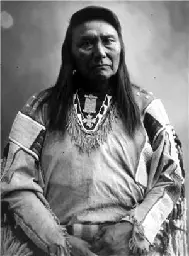Today in History - Oct 5 - Chief Joseph Surrenders
Today in History - Oct 5 - Chief Joseph Surrenders
Chief Joseph (1840-1904) was a leader of the Wallowa band of the Nez Perce Tribe, who became famous in 1877 for leading his people on an epic flight across the Rocky Mountains. He was born in 1840 an

October 5th is the anniversary of the day that Chief Joseph Surrenders in 1877. Chief Joseph was a great chief of the Nez Perce tribe, who famously attempted to flee to Canada.
Originally from what is now Oregon, he was told by the US regime that he needed to move to a reservation in Idaho to make room for white settlers. He and his band of course refused. But eventually, the US grew impatient and forced him from his land at gunpoint. Knowing that a war would not be winnable, he went to Idaho to rejoin the rest of his tribe. The peace didn't last anyway. After the white people murdered an Indian, fighting openly broke out.
It was decided that the best way of protecting the tribe would be to leave the country, and seek safe harbour with one of the Canadian tribes. Still opposing the war, Chief Joseph was to lead the refugees, while other chiefs fought the battles. Chief Joseph's hopes for some sort of peace were ultimately dashed however, when the US military managed to catch up with them. The military attacked the refugee camp, killing 80 people, most of whom were women and children. However, Chief Joseph was able to save their horses from slaughter, allowing the survivors to continue their flight.
Going through land deemed impassable by the American death squads, they evaded capture and made it to Montana. But a mere 100km from the Canadian border, their struggle was put to an end. Starving, freezing, and surrounded by US troops, Chief Joseph had no choice but to surrender. In his famous speech, he had this to say:
"It is cold and we have no blankets. The little children are freezing to death. My people, some of them, have run away to the hills and have no blankets, no food; no one knows where they are — perhaps freezing to death. I want to have time to look for my children and see how many I can find. Maybe I shall find them among the dead. Hear me my chiefs. I am tired; my heart is sick and sad. From where the sun now stands I will fight no more forever"
The US promised to return him to the reservation in Idaho. But ultimately they decided that upon seeing the state of their comrades, the remaining Nez Perce would be very upset. He and his followers were bounced along multiple reserves. Eventually landing in a small reserve in Washington, he lived the remainder of his life there. True to his word, he never went to war again. He never stopped begging the US regime to allow him to return home. They decided to allow him to make his case to the white settlers. He died in Washington. The physician who attended to him at his death said that he died of a broken heart.